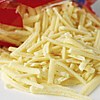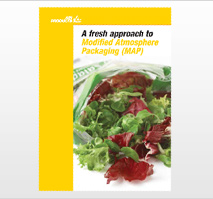Dairy Products

Food items: Aerosol Creams, Blue and White Mould-Ripened Cheeses, Butter, Cream Cakes, Creams, Custards, Fresh Cheeses, Grated Cheeses, Hard Cheeses, Margarine, Semi-Hard Cheeses, Sliced Cheeses, Soft Cheeses, Yoghurts, other items
Recommended gas mix
The gases and mixtures listed above are for general guidance. To identify the optimum gas for your product and process, we recommend you undertake a product trial, with the help of an Air Products MAP gas specialist. If you would like a specialist to contact you to discuss this more click here. Storage temperature Achievable shelf-life Principle spoilage organisms and mechanics |
Food poisoning hazards include Typical MAP machines Typical types of package** Examples of typical MAP materials Lidding and/or pillow
pack film: Bulk |
|||||||||||||||||||||
 The principal spoilage mechanisms affecting dairy
products are microbial growth and oxidative rancidity.
The type of spoilage affecting dairy products will
depend on the intrinsic properties of the different
products. For example, low a w products such as hard
cheeses are generally spoilt by mould growth, whereas
higher aw products such as creams and soft cheeses are
susceptible to yeast and bacterial spoilage, oxidative
rancidity, and physical separation.
The principal spoilage mechanisms affecting dairy
products are microbial growth and oxidative rancidity.
The type of spoilage affecting dairy products will
depend on the intrinsic properties of the different
products. For example, low a w products such as hard
cheeses are generally spoilt by mould growth, whereas
higher aw products such as creams and soft cheeses are
susceptible to yeast and bacterial spoilage, oxidative
rancidity, and physical separation.
MAP can significantly extend the shelf-lives of dairy products. Similar shelf-lives are achieved for MAP as opposed to vacuum packaging. Hard cheeses are generally packed in CO2 gas which is very effective at inhibiting mould growth. Soft cheeses are packed in CO2/N2 gas mixtures, which can also inhibit bacterial spoilage and oxidative rancidity. For soft or grated cheese, 30% CO2, 70% N2 is recommended. MAP is particularly effective for crumbly cheeses such as Lancashire and grated cheese where vacuum packaging would cause undesirable compression.
MAP is not recommended for mould-ripened cheeses since CO2/N2 gas mixtures would kill desirable mould growth, causing it to turn an unpleasant yellow. Creams are adversely affected by CO2 – containing atmospheres which cause acidification of the cream, giving it a sharp rather than smooth taste. Consequently, N2 is recommended for MAP of creams and cream-containing products. A gas/product ratio of 2:1 is recommended. By exclusion of air, N2 is also capable of inhibiting aerobic microbial growth and oxidative rancidity. Aerosol creams use nitrous oxide (N2O) as a propellant, which also inhibits oxidative rancidity.
Other dairy products such as butter and yoghurt are not usually MA packed but would benefit from packaging under N2. Possible food poisoning hazards associated with dairy products are primarily due to either inadequate pasteurisation or cross-contamination during or after packaging. Consequently, adequate pasteurisation, the maintenance of recommended chill temperatures, and good hygiene and handling throughout are essential for ensuring the safety of dairy products.





